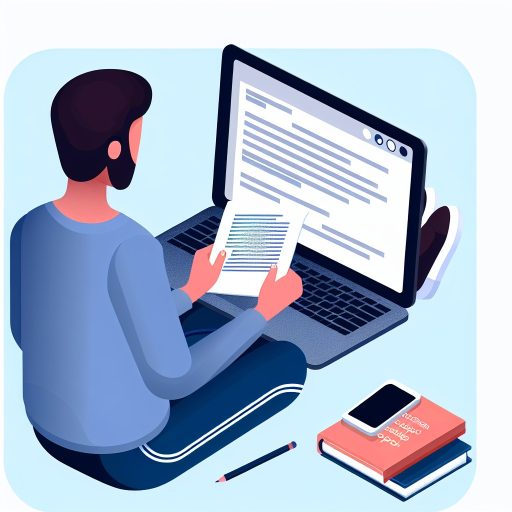Understanding the Importance of Balancing Theory and Practice in Coding
The Role of Theoretical Knowledge
Theoretical knowledge forms the foundation of effective coding skills.
It helps developers understand core programming concepts clearly.
Moreover, the theory allows programmers to grasp algorithmic thinking and data structures.
For example, knowing how sorting algorithms work optimizes coding decisions.
Therefore, solid theoretical understanding reduces errors during coding.
The Value of Practical Application
Applying coding skills through projects strengthens learning effectively.
Hands-on experience familiarizes developers with real-world challenges.
Additionally, practical coding builds problem-solving abilities and debugging skills.
So, working on projects promotes confidence and independence in writing code.
Furthermore, practice helps reinforce the concepts learned from theory.
Finding the Right Balance Between Learning and Doing
Balancing learning and applying coding knowledge is crucial for growth.
Too much theory without practice can lead to confusion and inactivity.
Conversely, coding without understanding underlying concepts causes fragile solutions.
Thus, alternating between studying and writing code improves retention and skills.
Developers should set realistic goals to combine both aspects efficiently.
Tech Consulting Tailored to Your Coding Journey
Get expert guidance in coding with a personalized consultation. Receive unique, actionable insights delivered in 1-3 business days.
Get StartedStrategies for Effective Balance
Schedule dedicated time for studying programming concepts regularly.
Then, implement small projects to apply newly acquired theoretical knowledge.
Use code reviews and pair programming to enhance learning through collaboration.
Also, reflect on mistakes during coding to solidify understanding.
Finally, stay curious and adapt approaches to maintain motivation and progress.
Identifying Key Learning Methods
Tutorials
Tutorials provide focused, step-by-step guidance on specific coding topics.
They help learners quickly understand particular concepts or features.
Moreover, tutorials often include practical examples for hands-on experience.
Many developers turn to platforms like Codecademy and freeCodeCamp for tutorials.
Therefore, tutorials serve as great starting points for beginners and intermediates.
Courses
Courses offer a structured and comprehensive approach to learning coding skills.
They usually cover fundamental concepts through advanced topics in depth.
Additionally, courses often include assignments and projects to apply knowledge.
Institutions such as Coursera and Udemy provide diverse coding courses by experts.
Build Your Vision, Perfectly Tailored
Get a custom-built website or application that matches your vision and needs. Stand out from the crowd with a solution designed just for you—professional, scalable, and seamless.
Get StartedConsequently, courses suit those seeking systematic learning with measurable progress.
Documentation
Official documentation remains the most authoritative source of coding knowledge.
It describes language syntax, APIs, libraries, and frameworks in detail.
Developers frequently consult documentation to verify correct usage and troubleshoot.
For instance, Python’s official docs or React’s developer documentation offer reliable information.
Thus, mastering documentation skills is essential for independent problem-solving.
Integrating Hands-On Coding Projects to Reinforce Theoretical Knowledge
The Importance of Practical Application
Hands-on projects deepen understanding beyond theoretical concepts.
They allow developers like Maya Chen to experiment with real code.
Consequently, learners grasp abstract ideas more effectively.
Moreover, applying knowledge helps retain information longer.
Software companies such as TechNexus encourage practical learning for skill growth.
Choosing Relevant Projects
Select projects aligned with personal or professional goals.
For example, Arjun Patel focused on building APIs to strengthen backend skills.
Relevant projects keep motivation high and encourage consistent effort.
Optimize Your Profile, Get Noticed
Make your resume and LinkedIn stand out to employers with a profile that highlights your technical skills and project experience. Elevate your career with a polished and professional presence.
Get NoticedAdditionally, projects reflecting current industry trends prepare learners for future roles.
Therefore, researching emerging technologies benefits project selection greatly.
Breaking Down Complex Concepts Through Coding
Complex topics become manageable when split into smaller coding tasks.
Emma Rodriguez improved her understanding of algorithms by coding step-by-step solutions.
Each segment of a project clarifies specific elements of theory.
As a result, learners build confidence with incremental achievements.
Thus, tackling complexity is less intimidating during project development.
Enhancing Problem-Solving Skills
Projects present real challenges that require analytical thinking.
Hassan Ali sharpened debugging skills while resolving bugs in his open-source app.
Encountering obstacles promotes creative and logical problem resolution.
Furthermore, collaborating on projects fosters teamwork and communication abilities.
These skills are essential in programming careers and contribute to career success.
Balancing Learning and Doing
Allocate time equally for studying concepts and building projects.
Leila Johnson schedules coding sessions after reviewing new topics each week.
This balance prevents burnout and maintains steady progress.
Moreover, reviewing theory after practical work reinforces learned material.
Regularly alternating between learning and applying keeps engagement high.
Utilizing Resources and Communities
Leverage online platforms, tutorials, and forums to support project work.
For instance, Ryan Kim benefited from feedback on GitHub for his Python projects.
Communities provide mentorship and encourage knowledge sharing.
Engaging with peers accelerates learning and opens networking opportunities.
Therefore, combining hands-on projects with community support maximizes growth.
Uncover the Details: How Collaboration Enhances the Value of Coding Projects
Managing Time Effectively Between Learning New Concepts and Coding Implementation
Understanding the Importance of Balance
Effective coding requires a balance between learning and application.
Spending too much time on theory can delay project progress.
Conversely, diving into coding without understanding causes frequent errors.
Therefore, balancing these tasks enhances productivity and knowledge retention.
Planning Learning and Coding Sessions
Start by allocating specific blocks of time for learning and coding.
This separation helps focus on each task without distraction.
Moreover, mixing both activities reduces mental fatigue.
For example, dedicate mornings to studying new concepts.
Then, use afternoons to apply those concepts through practical coding.
Setting Clear and Achievable Goals
Define what you want to learn before each session.
Clear goals increase motivation and direction.
Similarly, set practical coding milestones to achieve after learning.
This approach creates a productive feedback loop between knowledge and practice.
Using Active Learning Techniques
Apply new concepts immediately with small coding exercises.
Active practice reinforces understanding and uncovers gaps quickly.
Additionally, try to solve real-world problems related to your learning.
This method improves problem-solving skills and retention simultaneously.
Avoiding Common Time Management Pitfalls
Resist the urge to perfectionism when learning new topics.
Also, avoid jumping into complex projects too soon.
Both habits lead to wasted time and frustration.
Instead, maintain a steady pace and celebrate small progress.
Leveraging Tools and Resources
Use project management apps to schedule and track your learning sessions.
Online tutorials and coding platforms provide structured learning paths.
Furthermore, communities like coding forums offer real-time support and feedback.
All these tools can streamline your learning and implementation process.
Adjusting the Balance Over Time
Your learning and coding needs may change as projects evolve.
Periodically assess how much time you spend on each task.
Then, adjust your schedule based on your current goals and challenges.
This flexibility helps maintain motivation and continuous improvement.
Explore Further: Why Iteration is Key in Improving Your Coding Projects
The Role of Debugging and Problem-Solving in Applied Learning
Debugging as an Active Learning Process
Debugging transforms coding errors into valuable learning opportunities.
Developers like Marcus Blake approach bugs as puzzles to solve.
They learn new concepts by investigating unexpected behavior in their code.
Consequently, debugging strengthens understanding beyond theoretical knowledge.
This hands-on experience helps programmers internalize programming principles effectively.
Problem-Solving Builds Practical Skills
Problem-solving challenges developers to apply what they have learned practically.
Elena Moreno often encounters complex problems that require creative solutions.
These challenges push her to think critically and adapt her strategies.
Therefore, problem-solving nurtures flexible thinking and skill development.
It also fosters perseverance when facing difficult coding issues.
Integrating Debugging and Problem-Solving in Coding Projects
Coding projects naturally combine learning with applying knowledge through debugging.
For example, Liam Chen’s work at Apex Software emphasizes iterative problem-solving.
His team identifies bugs early and refines features based on feedback.
In this process, debugging and problem-solving improve both the code and the coder.
Thus, applied learning becomes an ongoing cycle of discovery and refinement.
Techniques to Enhance Applied Learning through Debugging
- Reproduce errors consistently to understand root causes clearly.
- Use debugging tools such as breakpoints and logging effectively.
- Discuss problems with peers to gain new perspectives.
- Document issues and solutions to reinforce knowledge retention.
- Iterate on fixes carefully to avoid creating new bugs.
By applying these methods, developers like Anika Patel advance both skills and project quality.
Applied Learning’s Influence on Career Growth
Mastering debugging and problem-solving equips programmers for real-world challenges.
Companies such as Solara Innovations value employees who learn actively and independently.
Applied learning leads to greater confidence and efficiency in complex projects.
Therefore, it plays a crucial role in professional development and job success.
Find Out More: How Real-World Problems Can Inspire Creative Coding Projects
How Project-Based Learning Accelerates Coding Skill Development
Engaging with Real-World Problems
Project-based learning immerses learners in solving real-world coding challenges.
Students develop practical skills that go beyond theoretical knowledge.
For instance, Maya Thompson created a web app to manage community events during her course.
This hands-on experience encouraged her to apply abstract concepts directly.
As a result, she gained confidence in debugging and optimizing code effectively.
Encouraging Active Problem Solving
Working on projects demands active problem-solving strategies.
Developers like Carlos Ramirez often identify multiple solutions before selecting the best one.
Consequently, learners refine their critical thinking and decision-making abilities.
Moreover, tackling unexpected bugs teaches perseverance and adaptability.
This approach also fosters creativity by challenging students to innovate with limited resources.
Enhancing Collaboration and Communication Skills
Projects frequently involve teamwork, which hones communication skills.
At NexaSoft Labs, interns collaborate on coding projects using agile methodologies.
Therefore, they learn to share ideas clearly and integrate diverse perspectives.
Additionally, collaborative tasks simulate professional development environments.
This interaction prepares budding developers to contribute effectively in future workplaces.
Building a Portfolio That Demonstrates Competence
Completing projects results in tangible work examples for portfolios.
For example, Lila Gupta showcased her data visualization projects during job interviews.
Thus, employers assess her coding skills through real artifacts, not just resumes.
Furthermore, portfolios highlight practical experience that theoretical study lacks.
This evidence can significantly enhance career opportunities in competitive markets.
Facilitating Continuous Learning Through Iteration
Project-based learning supports iterative development and continuous improvement.
Each project version allows learners to refine features and optimize code.
Software developer Ethan Marshall emphasizes how iteration deepened his understanding of algorithms.
Consequently, students internalize feedback and evolve their technical expertise.
This process mimics real software development cycles, enhancing industry readiness.
Explore Further: Turn Your Coding Projects Into Income: How Side Projects Can Pay Off

Balancing Perfectionism
Recognizing the Signs to Switch from Learning to Applying
Many developers fall into the trap of endless learning without practical application.
This often delays project progress and blocks skill development.
Therefore, identifying the right moment to start applying knowledge is crucial.
For instance, if you spend days studying a topic without building anything, pause and reflect.
Moreover, practical experience reveals gaps that theory alone cannot expose.
Consequently, switching early to application accelerates your learning curve effectively.
Common Perfectionism Pitfalls in Coding
Perfectionism can cause hesitation to start projects or share work.
It often leads to over-refining code before getting feedback.
Furthermore, this mindset reduces productivity and increases frustration.
Developers like Marcus Nolan at Vertex Systems emphasize progress over perfection.
Likewise, engineers at Cedar Innovations encourage iterative development and quick prototyping.
Adopting these approaches helps break perfectionism patterns efficiently.
Strategies to Transition Smoothly from Learning to Application
Set Clear, Achievable Goals
Define specific goals for both learning and applying phases.
This clarity helps measure readiness to move forward.
For example, complete a tutorial, then build a mini project using it.
Embrace Incremental Progress
Focus on small, functional features instead of perfect solutions.
This attitude fosters momentum and continuous improvement.
Seek Feedback Early and Often
Share your work with peers or mentors to get constructive criticism.
Feedback highlights strengths and reveals areas needing more learning.
Allocate Time Blocks
Devote dedicated time for coding projects separate from study sessions.
This balance encourages practical application without neglecting learning.
Benefits of Balancing Learning and Applying
This balance cultivates confidence as skills become tangible.
It also generates a portfolio demonstrating real-world abilities.
Furthermore, it enhances problem-solving by applying theory to practice.
Companies like Bluegate Solutions value candidates who deliver working code.
Consequently, you gain trust and potential career growth.
Utilizing Code Reviews and Feedback to Improve Both Learning and Application
Enhancing Understanding Through Peer Reviews
Code reviews provide valuable insights that deepen your coding knowledge.
They reveal alternative approaches and best practices that you might overlook.
Moreover, peer feedback highlights common mistakes and areas for improvement.
By reflecting on suggestions, you strengthen your problem-solving abilities.
Developers like Nathan Rivera recommend regular reviews to accelerate learning effectively.
Applying Feedback to Real Coding Projects
Feedback helps translate theoretical knowledge into practical skills.
Incorporating suggestions improves code quality and maintainability.
For example, Mia Johnson enhanced her project by adopting reviewers’ performance tips.
This process increases confidence when tackling complex programming challenges.
Consequently, your projects become more efficient and robust over time.
Creating a Culture of Continuous Improvement
Teams that prioritize code reviews encourage ongoing learning and collaboration.
Developers like Carlos Mendoza foster environments where constructive critique is welcomed.
This culture motivates everyone to write cleaner and more elegant code.
Continuous feedback loops ensure that skills evolve alongside technology changes.
Ultimately, this mindset drives both individual growth and successful project outcomes.
- Encourage clear and respectful communication during reviews.
- Focus on actionable suggestions rather than personal critiques.
- Set regular code review sessions to maintain momentum.
- Use tools like GitHub or GitLab to streamline the review process.
- Document common issues to build a shared learning resource.
Following these practices maximizes the benefits of code reviews.
They help balance learning and application seamlessly in software development.
Adapting Learning Strategies Based on Project Complexity and Deadlines
Assessing Project Complexity
Understanding the complexity of a coding project shapes your learning approach.
Simple projects allow rapid application of existing skills.
More complex projects require deeper research and careful planning.
For instance, implementing a basic website needs less new knowledge than building an AI model.
Therefore, you should allocate learning time according to the project’s demands.
Aligning Learning with Deadlines
Deadlines influence how much time you can dedicate to learning new concepts.
When time is limited, focus on applying tried-and-true techniques first.
This ensures steady progress without getting stuck on unfamiliar topics.
On projects with flexible timelines, invest more in understanding innovative methods.
Consequently, you can improve both project quality and personal skillset.
Balancing Learning and Doing
Striking the right balance prevents overlearning or premature application.
Begin by identifying critical areas requiring immediate knowledge.
Then, alternate between short learning sessions and hands-on coding.
Such cycles promote retention and practical problem-solving abilities.
Additionally, seeking feedback from teammates like Nathan from CodeCrafters can sharpen your approach.
Strategies to Adjust Learning Pace
Adopt these strategies to fit learning intensity with project requirements:
- Break tasks into smaller, manageable parts to learn incrementally.
- Use online tutorials or documentation for quick reference during coding.
- Schedule regular check-ins to reassess your learning progress.
- Prioritize learning new tools that directly impact the current project.
The Impact of Continuous Learning on Maintaining Coding Proficiency
Adapting to Rapid Technological Changes
The tech landscape evolves constantly.
It demands ongoing skill updates.
Software developers must embrace learning.
This helps them keep pace with innovations.
For example, Lydia is a frontend engineer at Solstice Tech.
She regularly explores new frameworks.
This habit ensures she delivers modern user interfaces.
Her interfaces also remain efficient.
Moreover, adapting quickly helps avoid obsolescence.
It is vital in competitive roles.
Strengthening Problem-Solving Abilities Through Learning
Continuous learning introduces fresh perspectives.
This applies to coding challenges.
Ravi works as a backend developer at Nimbus Cloud.
He credits his growth to mastering new algorithms.
Consequently, he improves system performance.
He also handles complex problems effectively.
Additionally, learning diverse techniques broadens his toolkit.
Therefore, his problem-solving skills continue to evolve.
Enhancing Confidence and Code Quality
Developers gain confidence when applying new skills.
Maria works at Innovex Solutions.
She improved product stability after attending advanced workshops.
Her confidence leads to cleaner code.
This code is more maintainable.
Besides, cleaner code reduces bugs.
It also speeds up the development cycle.
Fostering Collaboration and Knowledge Sharing
Learning encourages communication with teammates.
Mark is a software architect at Zephyr Systems.
He organizes internal learning sessions weekly.
These gatherings boost team cohesion.
They distribute expertise evenly among members.
Consequently, projects benefit from combined experience.
They also enjoy continuous team growth.
Balancing Learning and Applying to Sustain Proficiency
Successful programmers balance study with real-world coding.
Emily works at Vertex Solutions.
She applies lessons directly in client projects.
This approach reinforces knowledge retention.
It also sharpens practical skills.
Moreover, iterative application reveals learning gaps.
Hence, the cycle of learning and application maintains excellence.




